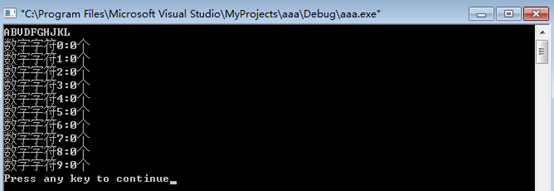第十次作业
1.编写程序,统计字符串中大写字母的个数。
#include<stdio.h>
main()
{
char str[20];
int i,cnt;
cnt=i=0;
gets(str);
while(str[i]!='\0')
{
if(str[i]>='A'&&str[i]<='Z')
cnt++;
i++;
}

2.编写程序,去掉字符串中所有的*号。例如,“***AB**C**DE**FG***”,处理完为ABCDEFG。
#include<stdio.h>
main()
{
char str[20];
int i,j;
i=j=0;
gets(str);
while(str[i]!='\0')
{
if(str[i]!='*')
str[j++]=str[i];
i++;
}
i=0;
while(i<j)
putchar(str[i++]);
}
printf("大写字母个数为:%d\n",cnt);
}

3.编写程序,将字符串组a中的字母复制到字符数组b中,要求每三个字符后插入一个空格。
#include<stdio.h>
main()
{
char a[20],b[20];
int i,j;
i=j=0;
gets(a);
for(i=j=0;a[i]!='\0';i++)
{
b[j++]=a[i];
if((i+1)%3==0)
b[j++]=' ';
}
b[j]='\0';
puts(b);
}

4.输出字符串中位置是奇数、ASCII为偶数的字符。
#include<stdio.h>
main()
{
char str[80];
int i=0;
gets(str);
while(str[i]='\0')
{
if((i+1)%2==1&&str[i]%2==0)
putchar(str[i]);
i++;
}

5.统计字符串中各数字字符的个数。
#include<stdio.h>
main()
{
char str[80];
int cnt[10]={0};
int i=0;
gets(str);
while(str[i]='\0')
{
if(str[i]>='0'&& str[i]<='9')
cnt[(str[i]-'0')%10]++;
i++;
}
for(i=0;i<=9;i++)
printf("数字字符%d:%d个\n",i,cnt[i]);
}



